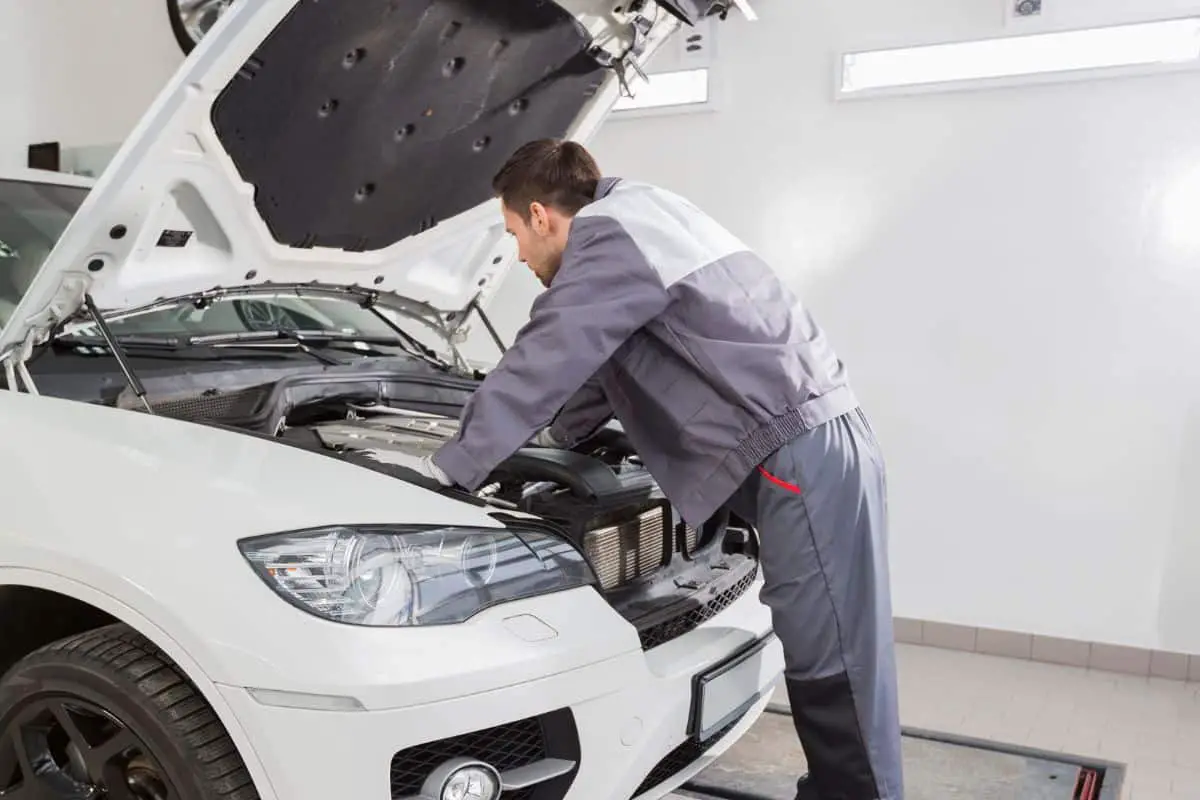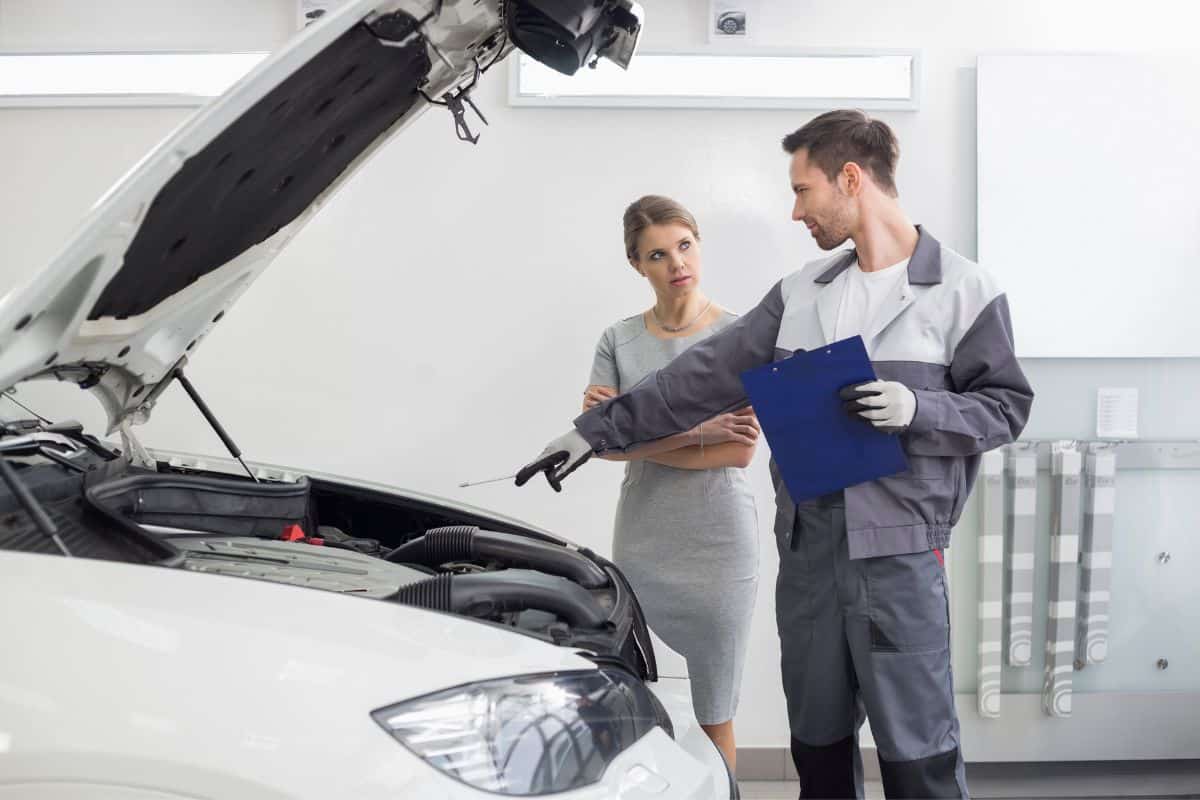Whereas oil changes aren’t necessary for an electric car, it would be naive to assume that there’s no maintenance required for electric cars at all.

And if you’re in the market for an electric car, it makes sense to find out what kind of maintenance is required, and whether you can afford it, before you go right ahead and buy one.
So this is the focus of this article, and I’ll be sure to cover everything you need to know in this regard along the way, answering all of your most frequently asked questions on the subject.
I’ll kick things off with some basics…
Do Electric Cars Need Oil Changes?
The reason a regular conventional car needs oil is that oil is required to lubricate the parts of the internal combustion engine.
However, a fully-electric car does not have an internal combustion engine, and for that reason doesn’t need any oil, or subsequently any oil changes either.
What’s more, there are also no other moving parts that require lubrication, such as pistons and valves. So the answer here is no, no oil changes are ever required for electric cars.
Do Electric Cars Need Annual Maintenance?
But that doesn’t mean that there’s no maintenance required at all.
Periodic maintenance is the best way to ensure that your EV is not only roadworthy but that it also remains in excellent working condition. And it’s only due diligence to give the car a check-up every once in a while.
Although the maintenance of an EV certainly has its differences compared to a regular car, some of the aspects do remain the same.
Take tires for example. Depending on how much use the car gets, you may have to rotate the tires on a regular or frequent basis, and sometimes replace them altogether.
Similarly, as with regular cars, with EVs, you also need to check tire pressure every once in a while, as well as checking if the wiper blades need changing, and of course replenish the washer fluid as needed.
The items mentioned so far can be checked by just about any car mechanic.
But for any maintenance that’s required specifically for electronic parts, you really ought to go directly to the car dealer’s service department and get everything looked over by the experts.
I would recommend that you get your electric car checked over every 6 months, just to be on the safe side. But don’t worry – there won’t be as much to check over as with a conventional car.
Do Electric Cars Have Expensive Maintenance?
Since EVs don’t require anywhere near as much maintenance as a regular car, this in turn means that maintenance costs are generally lower.
Not only do you not have the hassle of oil changes, but you also don’t have to worry about air filters either.
Whereas someone with a gas-powered car would be recommended to put nearly $1,300 a year aside to cover their maintenance costs, the automakers’ recommended maintenance comes in at about just two-thirds of that, coming in at a much more affordable $949 per year.

What’s It Cost To Replace The Batteries In An Electric Car?
Sadly, there’s no battery on this earth that lasts forever. And if you do invest in an EV and intend to use it for many years to come, there may come a time when the battery needs to be replaced because it’s not charging up adequately.
The time to do this is whichever comes first, 8 years of usage or 100,000 miles on the clock.
The cost of replacing the battery can range anywhere between $0 and $20,000, depending on a whole host of different factors.
However, the manufacturer warranty for the battery typically lasts about 8 years, so if a replacement is required in this time frame, you should get one completely free of charge.
What Maintenance Does An Electric Car Need?
Despite being relatively low-maintenance, you are strongly advised to carry out check-ups whenever necessary in order to comply with the manufacturer’s warranty.
Here’s a quick list of everything that needs to be checked before you hit 15,000 miles (the example I’m using here is for a Chevrolet Bolt EV):
- Tires, including the pressure, and whether rotation or replacement is required
- Windshield washer fluid
- Coolant level for battery
- Power inverter
- Charger modules and accessories
- Cabin heater
- Brakes
- Airbags
- Visual checks of suspension, steering, & chassis components
- Check for wear, leaks, or damage to power steering, drive shafts, and half shafts
- Door locks
- Check accelerator pedal for high effort or damage
- Tire sealant expiry date
- Flush road salt from the underbody
- Replace the windshield wiper blades
After 15,000 miles, there is more to check, as follows:
- Replacing the air filter
- Replacing the hood and/or lift supports and gas struts
- Replace the coolant
- Replace the brake fluid
- Replace the air conditioning desiccant
What Problems Do Electric Cars Have?
The reason for the difference between the maintenance of an EV and a conventional car lies of course in its makeup.
And it’s important to note that the lower maintenance requirements don’t necessarily mean there’s a lack of problems that can occur.
The biggest problem faced by EVs today is running out of juice before they can be recharged.
Also, the batteries can be sensitive to temperature, and charging time often takes a considerable length of time. Not to mention, there isn’t really a universal standard when it comes to plugs.
Unfortunately, regular check-ups do not actually solve all of these problems, but checking the coolant levels for the battery and replacing it when necessary is very important for keeping the battery temperature in check.
Wrap Up
The list of things to check on an EV that we listed earlier may look like a long list if you’re new to such things, but it’s a much shorter list than the one you would have for a regular car.
So, in short, the maintenance of an EV may be minimal, but it is still very important.
- Tesla Charger Installation Cost (Home Setups) - March 1, 2024
- Tesla Phone Key Disconnected (Troubleshooting Guide and Quick Fixes) - March 1, 2024
- Tesla FSD 12 (Explained) - March 1, 2024